
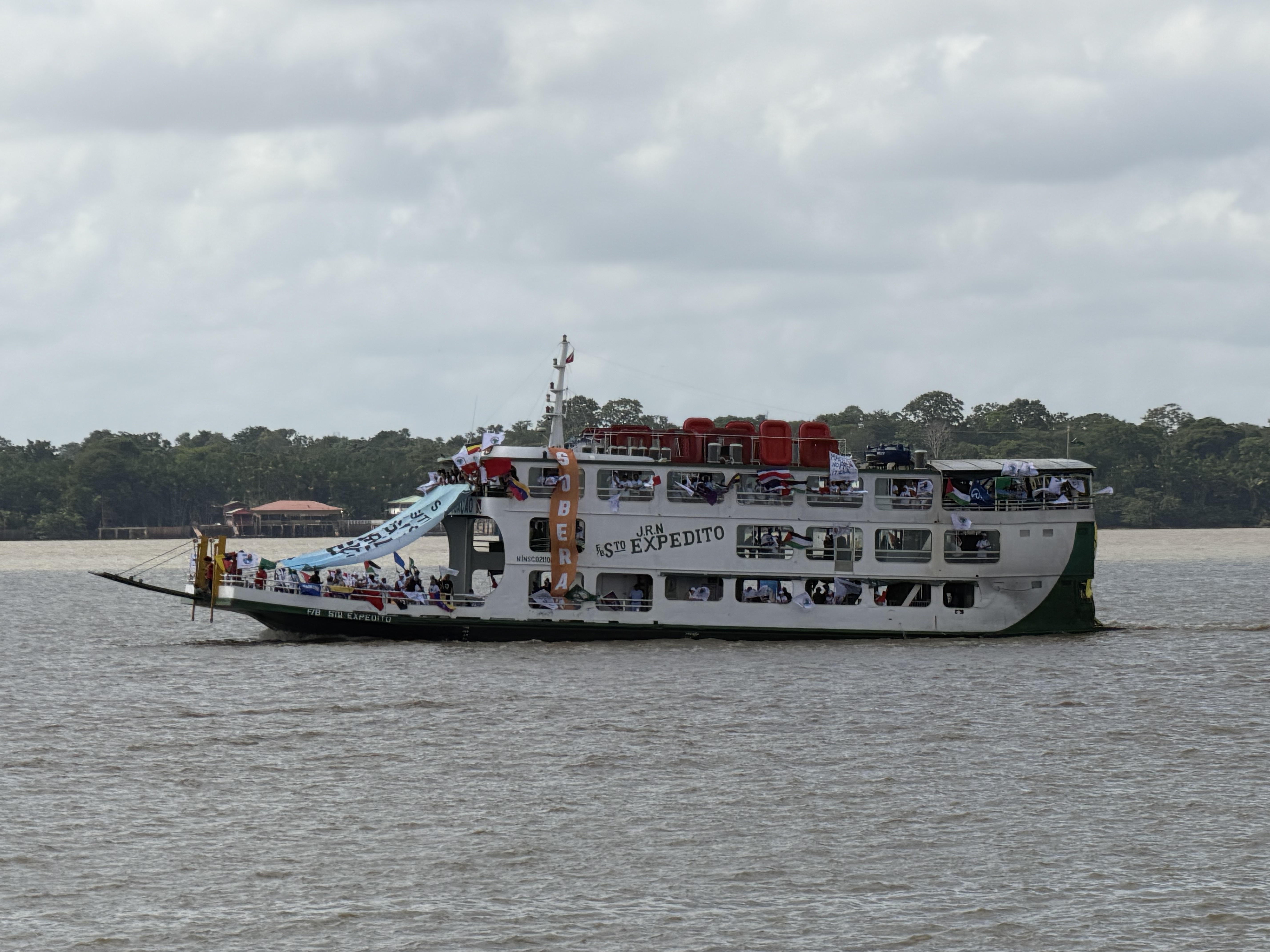
After last night's unpleasantness at the COP30 Blue Zone, protestors from indigenous peoples groups took to the waters near IETA's HQ to amplify their calls for greater engagement and access to the talks. Photo: AV
Day 3: 12 NOVEMBER 2025
The news headlines last night were dominated by the disturbance at the COP30 venue on Tuesday evening. A march of indigenous peoples' groups stormed through the security checkpoint at the entrance to the Blue Zone, but were fairly quickly subdued and ejected.
This morning in the Blue Zone, there was no sign of the damage that had been caused and business at COP was back to normal at 0700 hrs. And as the photo above shows, the protests have taken to the seas instead, and we've been treated to several passes by riverboats laden with banners and flags.
At a brief informal stocktaking plenary on Wednesday afternoon, COP30 president André Corrêa do Lago updated Parties on the consultations being held on the four additional agenda items that had been tabled at the start of this COP; namely, implementation of Article 9.1 (proposed by the Like-Minded Developing Countries group), addressing concerns over climate change trade-restrictive practices (the CBAM debate, also tabled by LMDC), responding to the NDC Synthesis report and addressing the ambition and implementation gap (Alliance of Small Island States) and on the synthesis of biennial transparency reports (EU).
Do Lago reported that Parties have engaged in spirit of mutirão (collective or joint effort) on matters relating to all four areas, but that "while discussions have certainly matured, we believe more sessions are needed to make more progress." He proposed that consultations continue, with another stocktake plenary to be held on Saturday.
Speaking shortly afterwards to the press, the EU's chief negotiator Jacob Werksman highlighted that there is no particular agenda item for this COP to capture the outcome of the latest round of NDCs, to recognise the progress made, or how to address the significant gap between NDCs and the 1.5 degrees Celsius pathway.
Werksman said the agenda item proposal from AOSIS, to discuss and decide on the updated NDC synthesis report, together with the EU's item to discuss the biennial transparency reports, should provide a good snapshot of current and planned pathways.
All four supplementary agenda items have brought up strong differences of views among Parties, he said, but he stressed they are not north-south divisions.
The next steps will include issues of process and on how progress will be captured in decision texts. "Brazil needs to find a place for draft decisions in the [existing] agenda, or we may have to revert to conversation about a cover decision," Werksman said.
He pointed out that the four supplementary agenda issue are important, but don't include other key topics such as adaptation, loss and damage, capacity-building or the other issues that tend to make up balanced packages. "If we go to the cover decision route, how do we include all these?" he asked.
Werksman was asked "what if the US sends delegation halfway through, or starts making calls [to delegations, as it did in the recent IMO talks]?"
"I have no evidence to suggest it's happening," he responded. "The US has made its views on climate change and on this process very clear. We hope that all the political dynamic happening here will maintain momentum in spite of any interventions."
Werksman was cautious on whether the supplementary agenda discussions on finance and on trade measures would lead anywhere concrete in Belém. "We're ready to talk about them in a way that doesn't prejudice the outcome," he said.
Outside the negotiations, the International Energy Agency's annual World Energy Outlook was published early this morning. The central scenario sees oil and coal demand peaking by or before 2030, and global gas demand is only set to rise by 10% from current levels. In all scenarios – even one where global climate action grounds to a halt, renewables will grow faster than any other major energy source, IEA said.
The report touched on the issue of energy security as well as ballooning energy use by data centres. Investment in data centres is expected to reach $580 billion in 2025, surpassing the $540 billion invested in global oil supply in 2025.
The outlook also reiterated that it is still possible to limit warming to 1.5 degrees Celsius this century. The IEA restated its long-held position that supply of oil and gas from existing projects are more than able to meet demand in a scenario where warming is limited to 1.5 degees C. No new projects are needed.
Lastly, we came across a short segment on the BBC World Service this week that looks at the prospects for the UN carbon markets in light of the completion of the Paris rulebook last year. It also gives a brief but thorough explanation of the different kinds of carbon markets in clear and easy to understand language. Obviously this is not directed so much to us as it is to all our various audiences, but we think could be a really useful tool. After all, it's not every day that a mainstream reporter understands the difference between allowances and carbon credits!
In the negotiations
In the resumed Article 6.2 Ambition Dialogue (see Monday's report) on Wednesday we saw the revival of the now-annual conversation on the role of REDD and Article 5, and its relationship with Article 6.
IETA remains of the view that the approach proposed by the Coalition of Rainforest Nations, led by Surinam and Honduras, does not meet the minimum integrity criteria that credits should adhere to. Nonetheless, that doesn't prevent CfRN members from reviving the discussion.
Our team felt there was not so much enthusiasm in the room for this approach, which would involve a re-opening of negotiations over Article 6.2. Some Parties dropped hints that they wouldn't be opposed to such a thing, but we do not believe there would be consensus to do this, particularly since Parties agreed last year to suspend negotiations on 6.2 until 2028.
On Article 6.4, we are still waiting for the COP to resume the consultations on the Report of the PACM Supervisory Body.
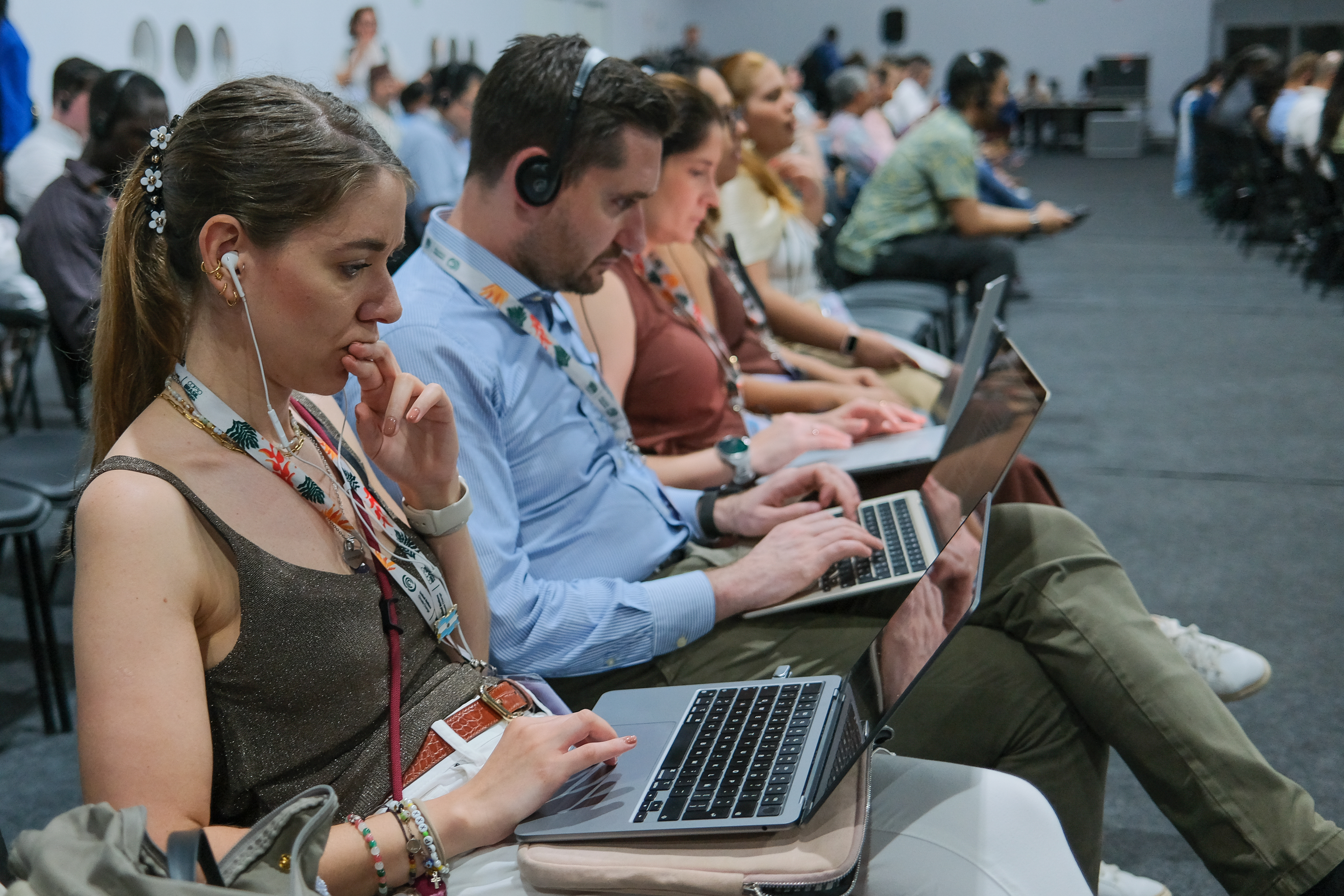
IETA's Agustina Cundari and Andrea Bonzanni hard at work tracking the Article 6 discussions. Photo: UNFCCC
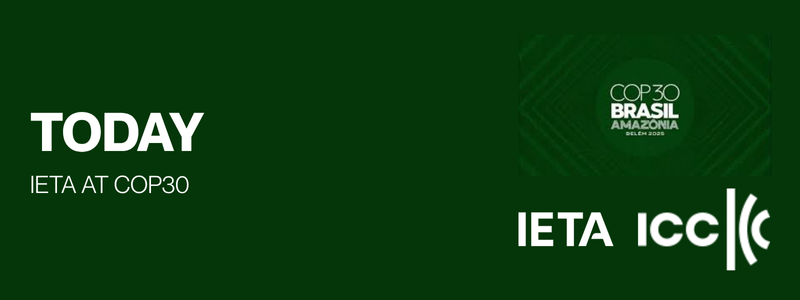
IETA staff were busy attending COP events and covering agenda items on Wednesday (see above).
Andrea Bonzanni participated in an ICC side event at our Pavilion on the Coalition to Grow Carbon Markets. We noted a rather different mood to that in the Article 6.4 negotiations – the side event involved practitioners who want markets to grow, rather than negotiators, some of whom hold rather more sceptical views.
Agustina Cundari participated in a side event on the Adaptation Fund and its relationship with carbon markets.
The discussion covered issues such as voluntary contributions to the Fund by Parties using Article 6.2 cooperative approaches, while for Article 6.4 the Share of Proceeds is already agreed – all we need is for the PACM to start operating.
There may be opportunities for this third round of NDCs to explicitly link their conditional targets (those that involve the use of Article 6 markets) to specific adaptation outcomes. Even the VCM can be linked to adaptation targets, in order to channel funds to resilience, as long as rules and practices embed contributions and strong integrity.
Elsewhere, Verra and the Gold Standard, with the participation of the government of Singapore, launched the Article 6.2 Crediting Protocol, which is intended to provide a harmonised and streamlined procedure for governments and independent crediting standards to follow when implementing Article 6.2.
The Protocol is intended to leverage existing crediting programme frameworks for the registration of mitigation activities, carrying out MRV, and issuing credits.
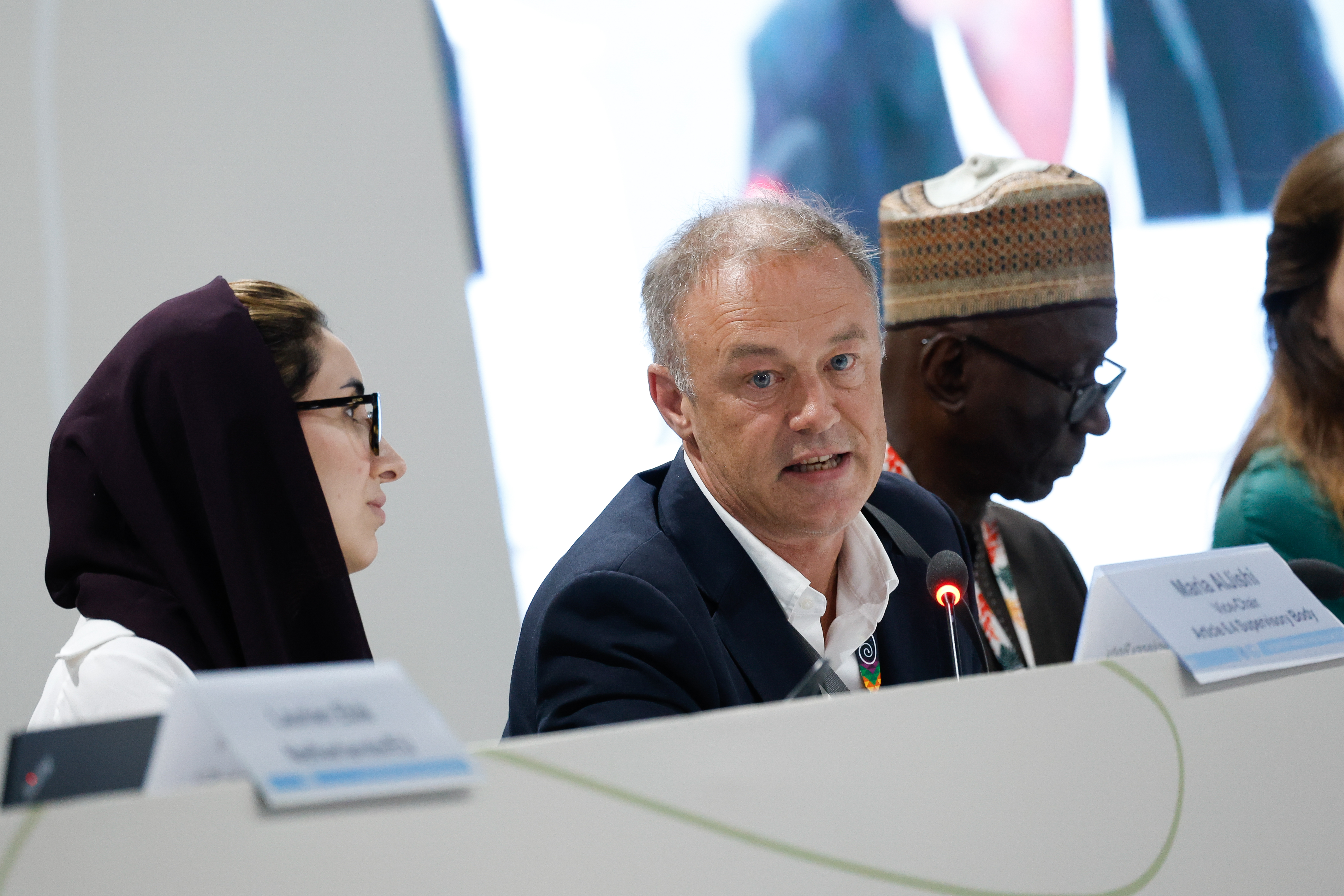
The outgoing chair and vice-chair of the SBM, Martin Hession of the EU and Saudi Arabia's Maria alJishi at Tuesday's side event on Article 6. Photo: UNFCCC
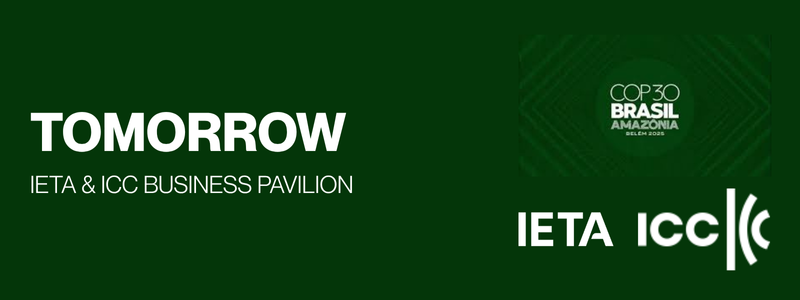
All event times are listed in Brasilia time (BRT), which is three hours behind GMT and 11 hours behind Singapore time.
The IETA/ICC Business Hub is located in Pavilion D145 (see image below). It's in area D of the Delegation Pavilions hall, quite close to the main entrance, and our neighbours are Colombia, the World Meteorological Organisation, Saudi Green Buildings Forum and the Oceans pavilion.
IETA has two side event venues within the Hub: the Boardroom and the Side Event Theatre. You can find the IETA schedule of events here, while the UNFCCC has produced an online schedule of side events here.
Thursday at the IETA-ICC Pavilion starts at 1000 BRT with an invitation-only session convening senior industry leaders, market experts and government voices to exchange insights on today’s rapidly evolving carbon accounting and reporting landscape. Participants will take stock of new and evolving carbon accounting initiatives, as well as discuss expectations through the COP30 Carbon Accounting Solutions launch. Speakers will include Lisa DeMarco of Resilient, Bruna Mascotte of Catavento, Noelia Nebra of ISO, Amy Brachio of Carbon Measures, and an invited panel of speakers. If you're interested in attending, please contact Lisa Spafford since space is very short.
At 1030 BRT the German environment ministry, GIZ and the Carbon Market Mechanisms Working Group will examine the potential for rice cultivation to generate emission reductions, despite challenges of measurement, crediting and scale. Experts from policy, research, and practice will discuss opportunities and barriers for accelerating credible, high-integrity mitigation outcomes from rice production through carbon markets.
At 1200 BRT, 1PointFive, the American Carbon Registry and GCC will discuss innovation in standards; how standards have innovated to evolve along with carbon markets since coordinating at COP28, and how the words have been put into actions producing results.
At 1330 BRT, IETA will host a discussion on the State of Article 6 Implementation. COP30 is an opportunity to take stock of the role of international carbon markets in achieving NDCs, increasing ambition, and mobilising climate finance flows. In this session, a panel of negotiators, experts and business representatives will share insights into Article 6.2 agreements and transactions, the operationalisation of the Paris Agreement Crediting Mechanism, the findings from the first Technical Expert Reviews, and what role Article 6 is expected to play in the next NDC cycle.
The last event of the day will take place at 1600 BRT. "Innovation in Action - Unlocking Value from Decarbonisation with Market Mechanisms Roundtable" is an invitation-only executive round table hosted by Dow and the Boston Consulting Group, that will explore how leading companies are transforming decarbonisation into value creation — collaborating across the value chain, activating market-based solutions, and turning ideas into impact. Again, space is limited, so please contact Lisa for further information.
Outside our Pavilion there are a number of markets-adjacent side events at other pavilions, the most interesting of which may be "Forest and Technical Carbon Removal Approaches within Compliance and Voluntary Carbon Markets", which starts at 1830 BRT in Side Event Room 5. Speakers will discuss the future of VCMs in light of Article 6, risks of greenwashing and strategies for environmental integrity, pathways to democratise access to carbon finance for grassroots and Indigenous communities, and bridging the gap between Global North finance and Global South climate needs.
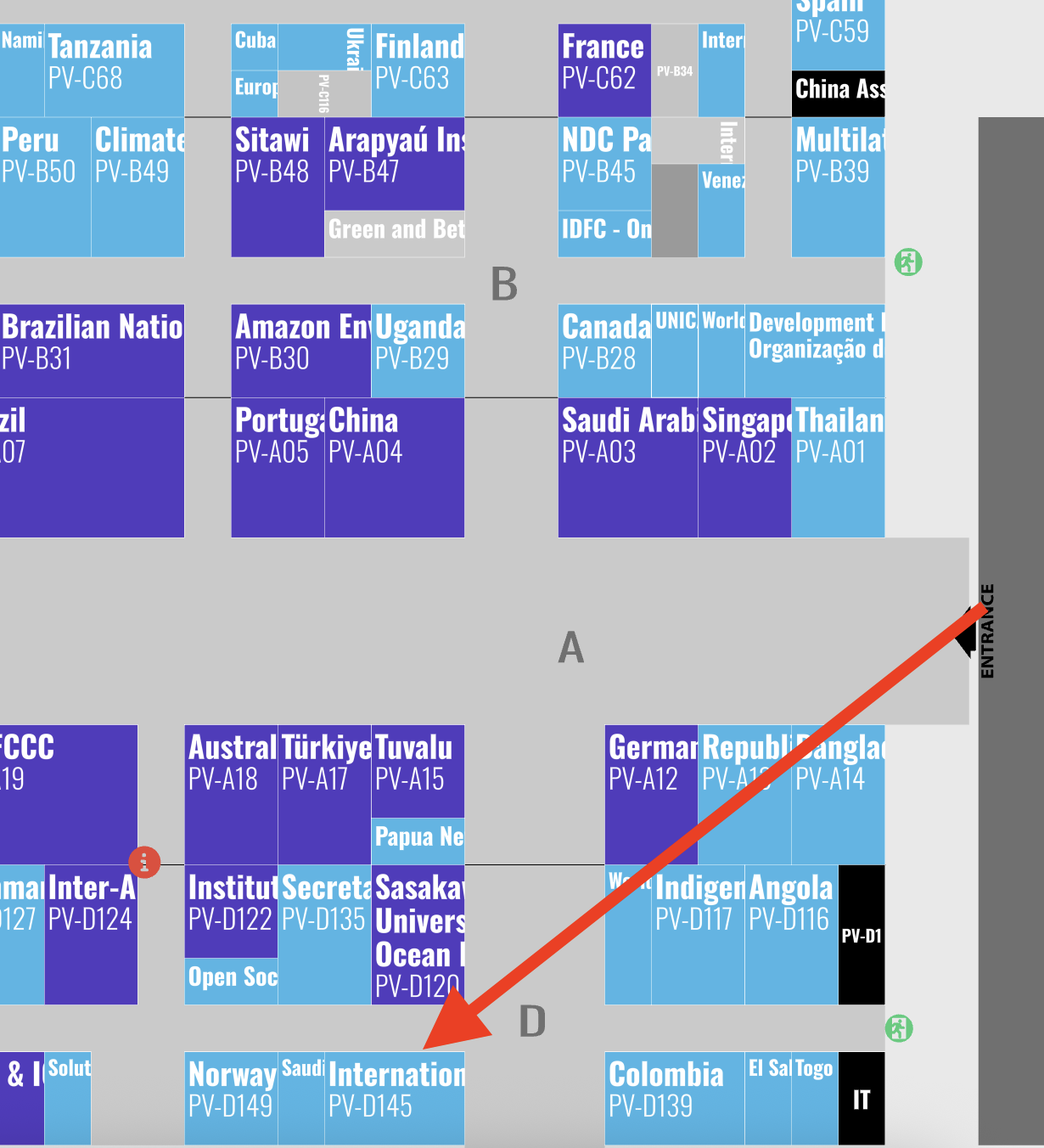
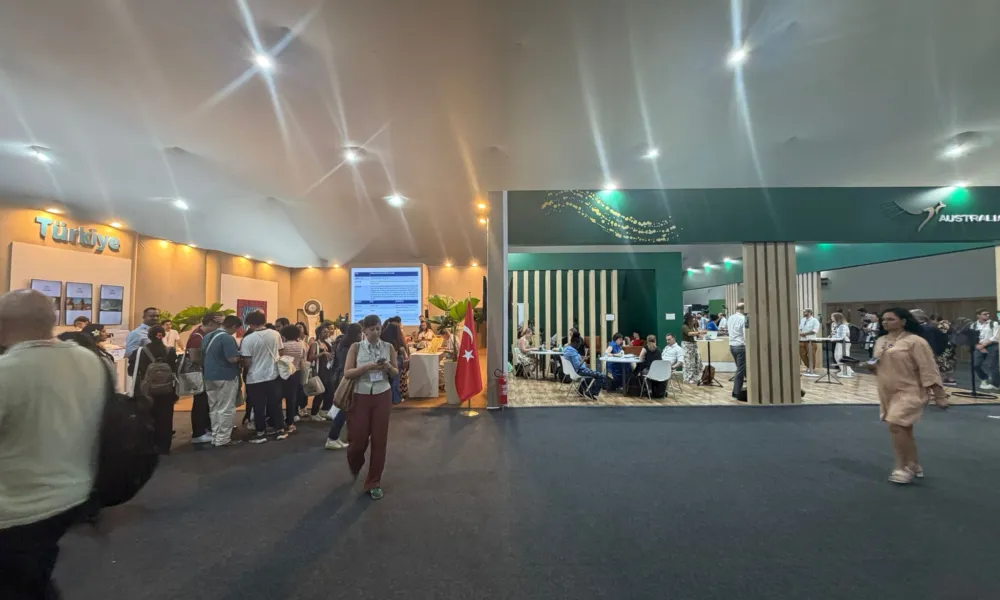
OK, it's not the greatest picture, but someone in charge of pavilion placement has a wicked sense of humour to put Australia and Turkiye next door to each other, given their long-running battle to host COP31. Both are serving coffee to long lines of delegates, and we'll be reviewing both this week. Photo: AV